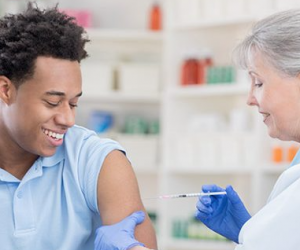Is it safe to get the COVID-19 vaccine at the same time as the seasonal flu vaccine? Do I need to get the flu vaccine if I continue to take precautionary measures against COVID, like wearing a mask and social distancing? What if COVID cases are spreading in my community? Should I hold off on getting the flu vaccine?
As we continue to navigate life during the ongoing COVID-19 pandemic, this year’s flu season is expected to be worse than last – fueling many questions about the best way to protect yourself and your loved ones.

The Advisory Committee on Immunization Practices (ACIP) recommends routine annual influenza vaccinations for everyone over the age of six months who do not have contraindications.
You should get vaccinated as soon as possible but definitely plan to get a flu shot by the end of October.
Remember that the vaccine takes two weeks to become fully effective. Influenza vaccines will continue to be offered as long as influenza viruses are circulating, so encourage your family and friends to get vaccinated as well.
Despite any preventative measures you are taking against COVID-19, you should still plan to receive a flu shot. If you have not already received a COVID-19 vaccine, you should also do so as soon as possible. Many patients may be eligible for booster shots of the COVID-19 vaccine. You can plan to get your COVID-19 booster vaccine and the flu vaccine in the same appointment, ideally by the end of October.
Due to the number of COVID-19 vaccines administered to date, many at the same time as other vaccines, the Centers for Disease Control and Prevention (CDC) says it is safe to get both together. You should speak with your health care provider or pharmacist about any concerns.
Anyone who is in isolation for COVID-19, or in quarantine for known or suspected exposure, should not be vaccinated against influenza until your symptoms have resolved. Those who are mildly ill can be vaccinated, but you may choose to hold off until you are recovered to avoid confusing COVID-19 illness symptoms and to avoid exposing health care providers. If you feel ill, please get tested for COVID-19 and get vaccinated against the flu when you have recovered.
Clark Kebodeaus, PharmD, BCACP, is associate professor and director of the UK Community-Based Residency Program in the UK College of Pharmacy.
















